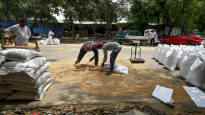When one country bans the export of food products, others typically follow suit. This will create a panic-like atmosphere, where prices will only rise higher, writes financial journalist Elli-Alina Hiilamo.
As the crisis approaches, hoarding begins.
This was seen, for example, in the early stages of a pandemic. States procured shield protective equipment, and many countries also banned their export to the rest of the world.
Now a similar hoarding is going on in the global food market, and that’s not good news.
Russia is undermined food security around the world. It has destroyed food supplies in Ukraine, known as the granary, and prevented food from being transported across the Black Sea. It is estimated that the number of people starving may increase as a result of hostilities alone several tens of millions (you switch to another service).
I already talked about the food crisis caused by the war in March. At the time, I asked a researcher who was familiar with the subject what should be done. How to prevent the uncontrolled rise in food prices and ensure that food is available around the world?
Senior researcher Kalle Hirvonen replied that at least it is clear what should not be done. Exports of food products should not be restricted, as this will only exacerbate the situation.
This was the case during the 2008 food price crisis. As large producer countries restricted their exports, prices rose even higher. World Bank researchers estimate that about 45 percent of the increase in rice prices and 30 percent of the increase in wheat prices at that time was precisely due to trade barriers, Hirvonen said.
However, barriers to trade and hoarding have been resorted to this time as well. So the response to the food crisis has been exactly as it should not be.
India, which has suffered from the heat, has banned the export of wheat and sugar. Indonesia, on the other hand, has restricted palm oil exports, and Turkey, for example, has restricted meat and other edible oils. According to the IFPRI database, trade in food products has also been restricted by Ukraine, Russia and many poorer countries. in addition
Also of these barriers to trade are likely to lead to more and more expensive prices.
The concern is that restrictions are spiraling and will be seen even more. Researchers at the IFPRI Research Institute warn (switch to another service)that in previous crises barriers to trade have been erected as a chain. When one country bans exports, the others follow suit, creating a panic-like atmosphere where prices are only getting higher and higher.
In Finland, the food crisis has so far been mainly reflected in rising food prices and the plight of farmers. We are not directly affected by export restrictions, as the degree of food self-sufficiency is high here and as a prosperous country, Finland can also afford to source more expensive products from the world market.
In hoarding, the strongest are typically the most successful. Those who can afford the toughest prices. Therefore, the situation could turn catastrophic for poorer countries.
Countries that import a large proportion of the food they consume from abroad are in a particularly difficult position. As the supply of the world market shrinks further due to export restrictions, will these countries soon have anything to buy?
The subject will be open for discussion until Friday, 10 June at 11 pm
